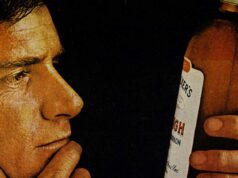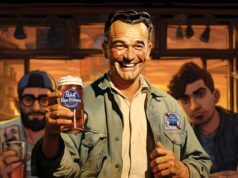Sylvanus Thayer—whose name sounds like a lizard-rat-man hybrid Lord Voldemort would keep caged for dark-magic rape rituals—took command of West Point in 1817.
Within a few years, Thayer was given the title “Father of the Academy,” as his unique brand of puritanical tyranny was crucial in developing the strict disciplinary standards West Point practices to this day. By 1826, this goddamn Philistine managed to ban alcohol, intoxication, tobacco, gambling, and any detectable levels of happiness, upon threat of expulsion. It was thus only a matter of time before a rebellion sparked up.
On the evening of December 24, 1826, an elite cadre of cadets chose to think for themselves instead of cowering at the feet of authority. But this decision wasn’t an unjustified sophomoric mutiny. It was a courageous revolution of youthful ideals, guilty only of recovering their spirit (and the other sort of spirits) from the tyranny of evil men. And so we resurrect our drunken comrades from their winter war in 1826 by remembering a night known as The Great Eggnog Riot.
It started with the successful mission to transport two gallons of whiskey from a local tavern back to West Point. William Burnley, Alexander Center, and Samuel Roberts were the student-soldiers responsible, and their smuggled booze would be used to brace the bowl of eggnog set aside for the North Barrack’s Christmas party. While the idea of pouring good whiskey into what is essentially pancake batter may seem a grievous mistake, keep in mind that it was the holidays and these cadets were mostly giddy teenagers.
Roberts and company weren’t the only cadets willing to disobey Thayer’s sober mandate. A number of other cadets had gathered liquid reinforcements to fuel the West Point’s Christmas eve festivities and while they were not highly coordinated there was an understanding that there would be fun to be found throughout the campus.
The sound of drums woke Sylvanus Thayer as North joined South to stand in what should be known as America’s First Fight for the Right to Party.
The drunken festivities were not limited to the cadet barracks. Thayer and his cronies were already caroling the night away at their own private holiday gathering, pouring down fine wines with the level of hypocrisy reserved for government officials.
The festivities in the student barracks might have started with only a handful of cadets, but by 2 am the party spilled into numerous rooms within the North Barracks. Unfortunately, the sounds of drunken cheer reached the ears of a few treacherous cadets who clearly did not have a firm grasp of that fine, long-standing cadet code of Not Ratting Out Your Fellow Cadets to the Goddamn Man. These vengeful snitches scurried away to inform the nearest authorities of suspiciously joyful sounds that simply must not continue.
The campus was constantly patrolled, and tonight the shift leader was Captain Hitchcock. He rushed to investigate and put a stop to that happy noise, but whoever answered the door was yet sober enough to maintain his composure and merely received a warning.
And so they proceeded with caution. Probably exchanged muted laughs as the door closed and bottles were hesitantly retrieved from hiding. But time passes and drinks are drunk until each voice tries to be heard over another’s and unintentionally betrays the party by informing the very person who wasn’t supposed to find out.
Awoken by the noise at 4 am, Hitchcock lumbered toward the chaos with intentions more severe than the previous warning. Instead of the student-soldiers who snapped to attention earlier, the good captain found eight cadets shitfaced on whiskey and Bisquick with no intention of groveling for mercy. Because of the hour, the only immediate punishment was having to listen to Hitchcock squeal out the riot act until finally leaving with vague threats of further repercussions in the cold light of day. The door closed and immediately vengeance was discussed until finally settling on the hilarity known to every adolescent male as “ding-dong-ditch.”
Hitchcock was jolted out of his army cot by a pounding at the door. He rushed to answer, but no one was there. With nothing better to do, the cadets kept this drunken dance going over the next few hours. After the fourth attempt, Hitchcock caught one of them running from the scene. The cadets tried to warn their comrades of Hitchcock’s approach, but it was in vain. Hitchcock burst through the door and demanded each soldier reveal the contents of their trunks. Undoubtedly answered with the 1820’s version of, “Go fuck yourself,” Hitchcock retreated in search of reinforcements.
He went in search of Lieutenant Thornton, who was tasked with patrolling the South Barracks, only to discover the Lieutenant had succumbed to a separate booze-fueled uprising. Earlier in the evening, Thornton had made a similarly vague disciplinary threat after confronting a group of drunken cadets, who chose a slightly more aggressive solution than the door-ditchers of the North Barracks. They decided it was more expedient to attack Thornton and knock him unconscious. Unsated by their first taste of blood, the drunken cadets marched to join their Northern comrades, all the while breaking as many windows as they could put a rock through.
In the meantime, a group from the Northern barracks sought out Hitchcock, just to talk, and found him barricaded in his room. Naturally the spirited lads felt inclined to attack because that’s what you do to barricades, they’d learned that in the classroom.
The campaign went well until one cadet decided the siege had gone on too long and fired his pistol into the room.
And that was that. The sudden blast of gunfire was the call of cold reality, halting the chaos long enough for Hitchcock to bound out of his hidey-hole and start making arrests.
While the riot continued elsewhere, Thornton regained consciousness and called for artillery to be brought in to gain control through scare tactics. A few soldiers overheard these orders and the word spread, causing a number of the revolutionaries to prepare for an attack by gathering fellow troops, most of whom traded their eggnog for guns.
By now it was past 5 am and the sound of drums woke Sylvanus Thayer as North joined South to stand in what should be known as America’s First Fight for the Right to Party.
Although the mutineers valiantly tried to maintain ranks, their numbers fell as cowards retreated upon the first sighting of Thayer. Those who remained held their ground and the battle continued for another hour until, like the biblical trumpet of doom, the reveille bugle sounded.
It was like they were waking up from a strange and violent dream. How had things gotten so out of control? they wondered, when all they were trying to do is have a good time on Christmas Eve by drinking a little eggnog. That’s all. A few kicks, a few laughs. Certainly nothing on the order of Shooting Through a Door at the Captain had been put forth by the party-planning committee.
Shaken, the rebels melted away and the officers regained control of the shattered campus.
Over the next few weeks, Thayer’s investigation would solicit 167 witness testimonies. Damages were assessed at $168 ($3,954 in 2015). Six cadets were expelled for bad conduct and several others were dismissed from the campus. Thayer decided the worst offenders, those who’d smuggled the whiskey and incited the riot, would be court-martialed, thus forever denying them the privilege of joining a military institution, but immediately earning them their titles as “Fathers of the Drunkard Revolution”.
All they wanted to do was celebrate a fine Christian holiday with a little unmuted cheer. It was not whiskey that riled the snake of rebellion, it was the crushing heel of oppression upon a snake that had tasted the freedom of whiskey that riled the serpent.
We’ve maintained many freedoms against sobriety since those days, but the drunkard’s struggle continues to this day. The U.S. Army’s website offered this regarding the riot: “Too much of the ‘good stuff’ can lead to serious consequences.” And my response is this: “too much” might be just the amount we need to re-light those fires from winter revolutions long ago.










